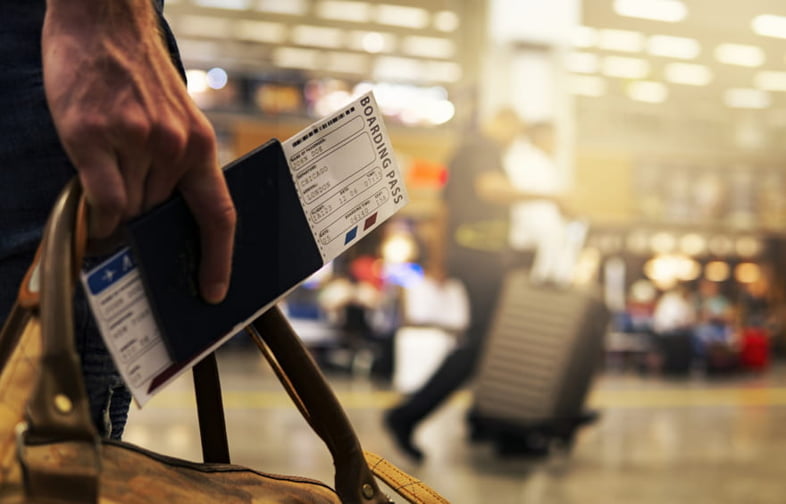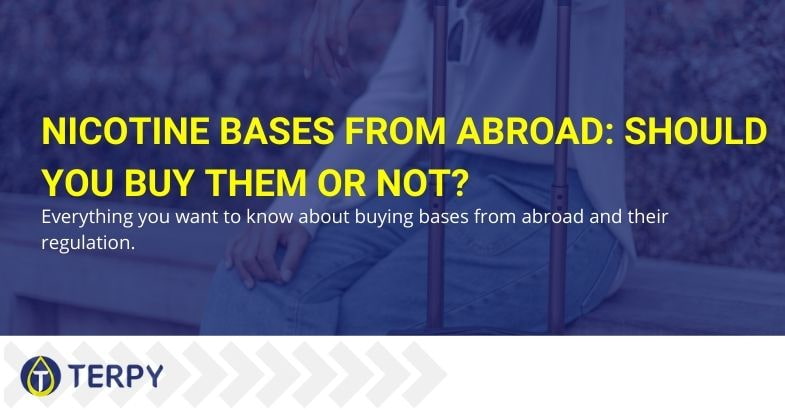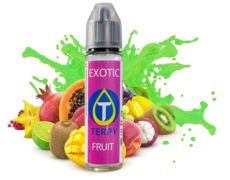Published on: 08/07/2022
Everything you want to know about buying bases from abroad and their regulation.
Looking for the best deals on bases for electronic cigarette liquids is very easy nowadays.
Just switch on your PC and spend some time searching.
Within seconds, endless possibilities will open up before you.
But is it just a question of price?
Read also: Who is the inventor of the electronic cigarette? History of the birth of the e-cig
Buying abroad: good idea or better to give up?


If you are also a “vaping” category member, you will almost certainly have looked online for the cheapest offers.
You will no doubt also have noticed that some sites offer nicotine bases at bargain prices.
Ahhh, the advantages of e-commerce… Or is it?
In this digital age, where everything is easily a click away, we can choose from many products from many parts of the world.
Almost always – and there are very few exceptions – a considerable price difference corresponds to an equally important difference in quality.
It might not be a problem if we were talking about buying products such as furniture or small household appliances, which are mainly destined to last a short time.
The same cannot be said, however, when we are talking about buying products that directly correlate with our state of health.
This is precisely the case with electronic cigarette liquids! The product you choose will go straight into your lungs.
Do you want to breathe in substances whose origin you do not know?
Would you endanger your health to save a handful of euros?
I don’t think so.
In general, within the European Union, the regulations on electronic cigarettes and vaping liquids are stringent and guarantee all users purchase high-quality products that do not pose a health risk to the consumer.
The same cannot be said of liquids produced outside the European Union.
So if you decide to buy bases for your electronic cigarette abroad, it is a good idea to check their origin and use only reliable and legally compliant retailers.
In this regard, below you will find the essential information on the Tobacco Product Directive (TPD): the European regulation governing the market for tobacco products and products containing nicotine.
Read also: Less harmful cigarettes: why e-cigarettes are less dangerous than traditional ones
What is the TPD? And what does it provide?
As mentioned above, the reference standard on the market for tobacco products and products containing nicotine is Directive 2014/40/EU.
This legislation aims to protect consumers’ health and control the placing on the market of related products.
But what does the regulation provide in detail?
In the case of e-cigarette liquids, it concerns particular products containing nicotine, and for bases without nicotine, it leaves the decision-making power to the individual states.
Let us see together what the regulation says concerning ready-mixed and pre-filled liquids (i.e. already inserted into e-cigarettes):
- the maximum permitted capacity of a bottle of liquid is 10 ml;
- only pure ingredients must be used in the production of the liquids;
- the maximum permitted nicotine limit is 20 mg/ml;
- the maximum permitted capacity of both tanks and pre-loaded pods is 2 ml;
- packages must be sold with a leaflet indicating the presence of nicotine and health warnings;
- the bottles must necessarily be unbreakable and have child-proof closures;
- substances such as dyes, diacetyl, caffeine or vitamins are strictly prohibited;
- sale to persons under the age of 18 is prohibited.
In addition, the regulation expresses the procedure to be followed to market nicotine bases.
Before liquids can be considered fit for sale, they must be notified by manufacturers or importers on a unique European portal, indicating the list of ingredients used and the chemical and emission analyses that have been carried out.
These declarations are then forwarded to the health authorities of each Member State. At this point, six months must pass, after which the sale will be authorised.
That is if all the necessary conditions have been met.
In addition to the European directives, the market for e-cigarette liquids (with or without nicotine) must comply with national regulations.
The competent body in Italy is the Customs and Monopolies Agency (ADM), responsible for checking that the following provisions are observed:
- electronic cigarette shops must have the authorisation to sell liquids (issued by ADM);
- the wholesale sale of liquids is only allowed to authorised tax warehouses;
- the online sale of liquids is only allowed to authorised tax warehouses;
- the online purchase of liquids for inhalation outside Italian territory is strictly prohibited.
Therefore, these are the European and national provisions regulating the production, purchase and sale of bases with nicotine.
But let us now assume that you are about to leave for a holiday abroad and are considering stocking up on some particular liquid you cannot find or would simply pay more for.
What should you expect at customs control? Do you risk any trouble?
Customs control: is it possible to bring in liquids bought abroad?


If you are about to go on holiday, you are probably making arrangements to take your electronic cigarette liquid with you.
In that case, it is a good idea to find out about it to avoid fines and imprisonment in the worst case.
Before moving on to the existing regulation on the free movement of inhalation liquids, let us specify one crucial thing.
As far as air travel is concerned, e-cigarette liquids are not to be considered on a par with available liquids. Dividing the quantity into bottles of no more than 100 ml is not enough to embark on your journey with peace of mind.
These products are not considered as mere liquids but tobacco, regardless of their nicotine level.
To better understand what the quantitative limits are for these substances, it is necessary to do some calculations, which I will spare you.
Through these calculations, it is possible to estimate the equivalence of the quantity of the liquid to the maximum amount of cigarettes permitted to cross customs legally.
The 2 cartons allowed corresponding approximately to 72 ml of liquid per refill.
According to the law, the limit above which tobacco smuggling is no longer considered an administrative offence is 10 kg (which corresponds to 2.7 litres of liquid).
Beyond this quantity, the current law provides a prison sentence of two to five years and a fine proportional to the amount introduced (EUR 5 per gram of tobacco).
Introducing 2.7 litres of liquid into Italy – Terpy‘s headquarters – will also trigger an administrative sanction, which can reach up to €50,000, excluding taxes, increased by two to ten times.
If, on the other hand, the illegally introduced quantity exceeds 2.7 litres, the actual offence of smuggling is triggered, punishable by imprisonment for two to five years and a fine of €5 for every 0.18 ml of liquid in excess.
Utmost care and information, therefore, if you are considering taking your cigarette liquid with you across the border. You don’t want to ruin your holiday, do you?
In summary, is it worth buying nicotine bases from abroad?
Buying nicotine bases abroad might seem like a bargain to you.
In light of the provisions I have explained, however, it can cost you dearly!
The best solution to avoid dangerous risks to your health or arrest for smuggling tobacco products is still to turn to authorised shops and, above all!
Well, we hope we have satisfied your curiosity, and before we say goodbye, we invite you to look at the items on sale at Terpy.com, Europe’s number 1 vape shop.
We are waiting for you!





